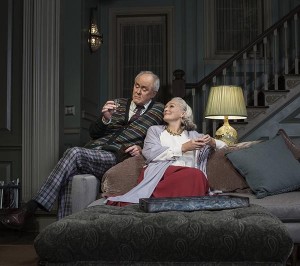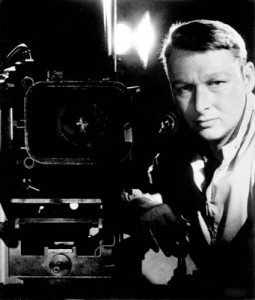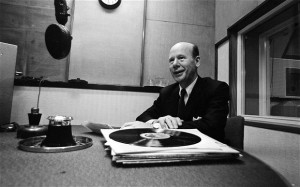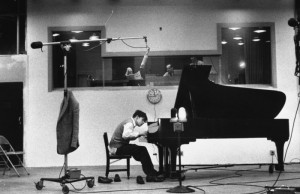In today’s Wall Street Journal I review the new Broadway revival of A Delicate Balance. Here’s an excerpt.
* * *
Everybody knows Edward Albee’s “Who’s Afraid of Virginia Woolf?” Not so “A Delicate Balance,” which came along four years later, in 1966, and failed to make the same culture-shifting stir. Though it won the Pulitzer Prize that “Virginia Woolf” absurdly failed to nail, the first production ran for only 132 performances, and the 1996 Broadway revival, despite glowing reviews, didn’t do much better. While “A Delicate Balance” is now seen regionally with some regularity, I doubt it would have returned to Broadway for a third try were it not for Glenn Close, who was last seen there 20 years ago and whose inclusion in the cast is making it—at last—a very hot ticket indeed.
 Aside from Ms. Close’s presence, what has changed about “A Delicate Balance” in the intervening half-century is that its author has metamorphosed from American theater’s angry young man into its grumpy elder statesman. In between he was seen as a back number, a writer of eccentric, sometimes impenetrable plays who after “Virginia Woolf” couldn’t get a good review to save his life. At length the critical tide turned, but Mr. Albee is still what he always was, a wildly uneven author whose worst plays are so bad that it hardly seems possible that they were written by the same man who gave us the best ones. Where does “A Delicate Balance” fall on that spectrum? At its best, it’s thought-provoking and sometimes challenging, but it takes a long time to get moving, and I wonder whether modern-day audiences will be willing to wait for it.
Aside from Ms. Close’s presence, what has changed about “A Delicate Balance” in the intervening half-century is that its author has metamorphosed from American theater’s angry young man into its grumpy elder statesman. In between he was seen as a back number, a writer of eccentric, sometimes impenetrable plays who after “Virginia Woolf” couldn’t get a good review to save his life. At length the critical tide turned, but Mr. Albee is still what he always was, a wildly uneven author whose worst plays are so bad that it hardly seems possible that they were written by the same man who gave us the best ones. Where does “A Delicate Balance” fall on that spectrum? At its best, it’s thought-provoking and sometimes challenging, but it takes a long time to get moving, and I wonder whether modern-day audiences will be willing to wait for it.
The place is “a large and well-appointed suburban house.” The time is “now.” The occupants are Agnes and Tobias (Glenn Close and John Lithgow), a hard-drinking couple of the “upper-upper middle-middle” class (Mr. Albee’s phrase) who are leading the usual lives of quiet desperation, and Claire (Lindsay Duncan), Agnes’ hatchet-tongued alcoholic sister, who seems to have no occupation beyond drinking, playing the accordion and saying horrible things to everyone she meets. Enter Harry and Edna (Bob Balaban and Clare Higgins), Agnes and Tobias’ best friends, who drop in for (of course) a drink, confess to having become “frightened” for no specified reason, ask to spend the night and return a little later with all of their belongings. Agnes puts them up in the bedroom of Julia (Martha Plimpton), her grown daughter, who has been married four times and comes home in between husbands. Julia arrives and finds that her room is occupied, upon which all hell promptly breaks loose.
While the notion that well-do-do WASPs are dead inside is perhaps the least little bit overfamiliar, this is still a fairly promising setup for a theater-of-the-absurd comedy. But “A Delicate Balance” runs for two hours and forty-five minutes, and nothing much happens until midway through the evening. Instead we get a truckload of genteel drawing-room badinage, none of which glitters nearly so much as Mr. Albee supposes…
Ms. Close’s performance is quiet, tasteful and underprojected, not surprising for an actor who has been absent from the stage for so long. Mr. Lithgow, by contrast, is in extraordinary form, by turns tightly inhibited and almost shockingly anguished….
* * *
Read the whole thing here.
A scene from the 1973 film version of A Delicate Balance, directed by Tony Richardson and starring Katharine Hepburn, Paul Scofield, Joseph Cotten, and Betsy Blair:


 Fortunately, the “Desert Island Discs”
Fortunately, the “Desert Island Discs”  • Bach’s Goldberg Variations, recorded in 1955 by Glenn Gould
• Bach’s Goldberg Variations, recorded in 1955 by Glenn Gould You are always asked to pick one favorite record on Desert Island Discs, and mine is the Goldberg Variations.
You are always asked to pick one favorite record on Desert Island Discs, and mine is the Goldberg Variations.